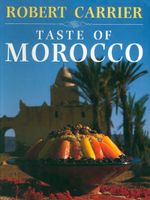🔥 Try our grilling cookbooks and save 25% on ckbk membership with code BBQ25 🔥
Spelling – a cause for confusion
Published 1987
It is in the realm of sweets, cakes and pastries especially that the phonetic French or English spelling of Moroccan dishes can become a problem: it is important to remember that Moroccan – in contrast to classic Arab – is a spoken language, and thus phonetic spellings can vary enormously. B’stilla – which is variously spelled pasteeya, bisteeya, bstila, pastilla or even pastela or bastela – is a case in point; as are m’hanncha (sometimes spelled m’hancha) and gazelle’s horns (called kab-aghzal, kab el ghzal or even kaab el ghazul). The paper-thin leaves of home-made pastry are called warkha or ouarka; sfenj are often spelled sfinges, sellou is sometimes slillou; shebbakia are sometimes spelled chebakia or chebbakiya; ghoriba are also known as ghoryba or even ghorayebah; briouats are often seen as braewats; and the pastry envelopes called rghaifs as rghayefs or even er ghaifs.
In this section
Part of
Advertisement
Related Recipes
-
-
-
-
Related Reference
-
-
-
-
Advertisement



